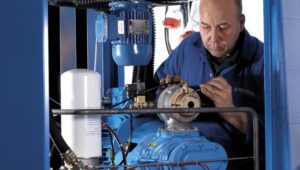
Having a reliable air compressor is essential for many businesses and DIY enthusiasts. Whether you use it for powering tools, inflating tires, or painting, your air compressor needs proper maintenance to ensure optimal performance and longevity. In this article, we will discuss the top servicing techniques every user should know to prevent their air compressor from failing at crucial times.
Regular Inspection and Cleaning
Regular inspection and cleaning are vital to keep your air compressor running smoothly. Here are some key points to consider:
Check the Air Filter
- Inspect the air filter regularly and clean or replace it as needed.
- A clogged air filter can decrease the efficiency of your compressor and lead to overheating.
Inspect for Leaks
- Check for any leaks in the hoses, fittings, and connections.
- Leaks can decrease the pressure and performance of your air compressor.
Clean the Motor
- Keep the motor clean and free from dust and debris.
- Buildup can cause the motor to overheat and eventually fail.
Proper Lubrication
Proper lubrication is crucial for the moving parts of your air compressor. Here's how you can ensure proper lubrication:
Use the Right Oil
- Refer to the manufacturer's specifications to determine the correct type of oil for your air compressor.
- Using the wrong oil can cause damage to the internal components.
Regularly Check and Change Oil
- Monitor the oil level in your compressor and change it as recommended by the manufacturer.
- Dirty or old oil can lead to increased friction and wear on the parts.
Maintain Proper Air Pressure
Maintaining the correct air pressure in your compressor is essential for its performance and efficiency. Follow these guidelines:
Use a Pressure Gauge
- Regularly check the air pressure using a pressure gauge.
- Ensure the pressure is within the recommended range for your compressor.
Adjust Pressure Settings
- Make sure to adjust the pressure settings based on the tools or equipment you are using.
- Using the wrong pressure can affect the performance and lifespan of your compressor.
Drain the Tank Regularly
Draining the tank of your air compressor is important to remove moisture and condensation, which can cause corrosion and damage. Here's how you can do it:
Manual Drain Valve
- Locate the manual drain valve at the bottom of the tank.
- Open the valve to release any accumulated moisture.
Automatic Drain Valve
- If your compressor is equipped with an automatic drain valve, ensure it is functioning properly.
- Automatic drain valves can help maintain the tank's dryness without manual intervention.
Professional Maintenance
While performing regular maintenance is crucial, professional servicing can also help ensure the longevity of your air compressor. Consider the following:
Schedule Regular Service
- Arrange for professional servicing at regular intervals to inspect and tune up your compressor.
- Professional technicians can identify potential issues before they escalate into major problems.
Follow Manufacturer's Recommendations
- Adhere to the manufacturer's recommendations for maintenance and servicing of your specific air compressor model.
- Following the guidelines can help you avoid unnecessary repairs and breakdowns.
By following these top servicing techniques, you can ensure that your air compressor remains in top condition and continues to perform efficiently for years to come. Remember, regular maintenance is key to preventing unexpected failures and costly repairs. Take care of your air compressor, and it will take care of you when you need it most.